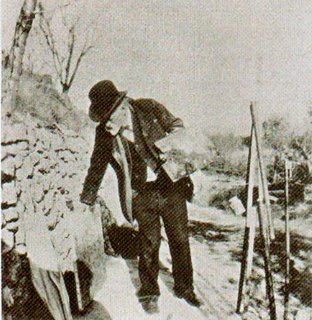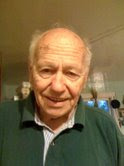We live on a country road three miles from a village. There is only one way in and out. Whenever I need to go somewhere, I pass the same handful of houses and farms each time.
One of the houses sits right on the edge of the road. It’s an old tenant farmhouse built probably around the turn of the old century - in other words, around 1900. Built when the old road was closer to the river. We live on the Shenandoah River.
Sometime last summer something new appeared outside this house. A sign was constructed on the front lawn, set in such a way that one passing by on the road could not help seeing the message.
This sign was constructed of two four-by-four wood posts set in the ground. The posts stand about ten feet high, about twelve feet apart. Two cross beams hold them together. The cross beams are about two feet apart, three-quarters the way up the vertical posts. Maybe you can visualize how the whole thing looks.
Inside the two horizontal beams was placed a sign made of some heavy white material upon which was written in plain handwritten black and white: “Proud Parents of a Soldier in Iraq.”
Next to the sign stood a flagpole perhaps twice the height of the wood signpost, an oversized American flag proudly waving in the breeze.
Every time I drove by this sign, I would feel a certain kind of ire. Three, four times a week I was reminded of the horror, the upheaval, the terror and the destruction of human life going on day in and day out, seven days a week, four weeks a month, twelve months a year – now four long years of bloodshed and heartache for so many.
The turmoil half-way around the world had entered my personal world. It was nothing like the black and white print of newspapers [which I avoided.] nor like the full-color gore of the TV stories [which likewise I avoided].
Every time I drove by, I wondered about this family’s pride. Wondered about their mindset. I understand the meaning of patriotism and all that. Nevertheless, I just don’t understand how it comes about, this new brand of it, which I am prone to label “righteous violence.”
I mean these are ordinary, honest, hard working, decent folks. Their place is immaculate. They have a small parcel of land, perhaps an acre or less. Three brown horses munch away in a tiny pasture. Two teenagers, and guy and a gal, regularly mow the lawn. A clean small pick-up sits in the driveway. The house is brightly painted every other year.
How, I wondered…how do they find themselves proud of a son’s horrifying ordeal?
But I kept urging myself to resist making judgments. I kept telling myself I had made a commitment to be non-judgmental. Do not condemn, my motto.
Every year we go south to spend January and February fleeing the coldest months. We take ourselves in our old twenty-one foot RV, and ramble on down to Florida. What with the cost of heating fuel these days, shutting down the house for two months saves us enough cash to pay for a good part of our stay in the warmer south. We visit friends and hang out in small, inexpensive campgrounds. Such is the lifestyle of a retired bloke.
So, the last day of February we are coming home. It’s still a bit chilly, but tolerable. 2006 has been not bad.
Once you cross the bridge, the road curves to run parallel with the river. Not far from this point stands the old farmhouse. As we approached, I remembered the sign, and steeled myself for the moment.
The signpost was still there, of course. But the sign was gone. Instead of the proud-parents message, there was nothing. An empty space.
Only two red fabric bouquets. They were pinned to the upright poles right where the cross beams connected. They reminded me of the poppy flowers people use to wear on their lapels commemorating the dead heroes of World War One.
And the flagpole was bare. No flag waving. The ropes to raise a flag were draped to a nearby tree. As if the wind had tossed them into the branches where they had gotten stuck. The curve of the white ropes, coming down from the top of the flagpole and then rising into the tree branch, traced a heart wrenching, eloquent silent message.
Their son was dead. Gone. They had lost their precious child.
My heart went to my throat. I know the feeling well. I too have lost a son. Sixteen years ago. He was nineteen, a motorcycle courier, absolutely fearless, a bit too careless, crushed by a Canada Dry beverage truck. He too, caught under the heels of the machine – the industrial/military machine.
I drove past their house feeling so saddened. I wanted to stop and offer condolences. We are not close neighbors. Our house is two miles further down the road. We have never met, nor spoken to each other.
Now, every time I pass, my urge to stop and commiserate gets stuck in my throat. I am afraid to approach the family. I picture myself walking up the porch steps to the front door, knocking or ringing the bell, waiting for whoever is inside to come and open the door. I picture the mournful face of the mother, and tremble at the thought of looking into her eyes. I am afraid of what I will see.
I’m afraid to discover that we really don’t live in the same world. Afraid we won’t understand the nature of our individual grief. Losing a son, we both know how that feels. But do we both attach the same meaning to the event? Do we both see the same way, see who is the real culprit behind this tragic moment?
I’m afraid...really and more simply put…just afraid.
So, I drive by, saddened for them, and, more often than not, with tears in my eyes.
I tell myself, I must stop…maybe tomorrow I’ll stop and knock on their door.
Maybe tomorrow…
 Inside this building, the world of Provence, France, circa 1880-1906 comes alive from the work of this immortal artist, considered the father of modern art.
Inside this building, the world of Provence, France, circa 1880-1906 comes alive from the work of this immortal artist, considered the father of modern art.




